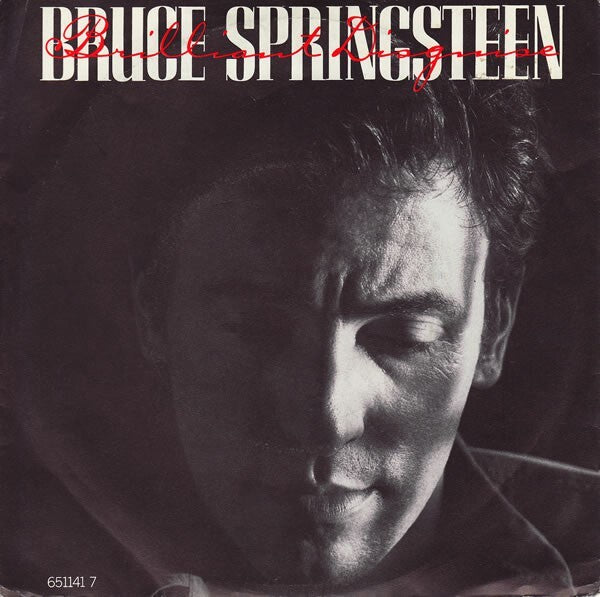When Bruce Springsteen released "Brilliant Disguise" in 1987 as the lead single from Tunnel of Love, many fans expected another anthemic rocker. Instead, they encountered something far more unsettling: a haunting meditation on trust, intimacy, and the masks we wear in our closest relationships. What emerged was perhaps one of Springsteen's most psychologically complex songs, wrapped in deceptively simple folk-rock arrangements.
The surface story: doubt in paradise
On first listen, "Brilliant Disguise" presents itself as a straightforward narrative about romantic suspicion. The protagonist questions whether his partner is being truthful, wondering if the person lying beside him is genuine or performing an elaborate deception. But this surface reading barely scratches the psychological depth Springsteen achieved with this composition.
The song's genius lies in its ambiguity about who exactly is wearing the disguise. While the narrator questions his partner's authenticity, the very act of such intense scrutiny reveals his own emotional disguises—the protective barriers he's constructed around vulnerability and trust.
The mirror of self-reflection
What makes "Brilliant Disguise" extraordinary within Springsteen's catalog is how it functions as both accusation and confession. The protagonist's obsessive questioning of his partner becomes a form of projection, reflecting his own struggles with authenticity in intimate relationships.
Advertisement
This psychological complexity emerged during a pivotal period in Springsteen's personal life. Writing during his first marriage to Julianne Phillips, he was grappling with the collision between his public persona as rock's working-class hero and his private reality as a wealthy celebrity navigating high-profile relationships under media scrutiny.
The weight of performance
The song's central metaphor—the "brilliant disguise"—operates on multiple levels. There's the obvious interpretation of romantic deception, but Springsteen was also exploring the broader theme of performance that had dominated his career. How does someone whose job is essentially performance distinguish between authentic self-expression and calculated presentation?
The folk-influenced musical arrangement reinforces this theme. Stripped of the bombast that characterized much of his earlier work, the song's intimate production mirrors its lyrical vulnerability. The acoustic guitar fingerpicking creates space for contemplation, while the subtle orchestration adds emotional weight without overwhelming the narrator's internal dialogue.
Trust as a luxury
"Brilliant Disguise" arrived at a moment when Springsteen was questioning not just personal relationships but his relationship with fame itself. The song captures the paranoia that can develop when genuine connection becomes complicated by external pressures, wealth, and public attention.
The narrator's inability to accept his partner's love at face value reflects a deeper anxiety about being loved for who he truly is versus who he appears to be. This theme would resurface throughout Tunnel of Love, but nowhere with such concentrated psychological intensity.
Advertisement
The universality of emotional disguises
While rooted in Springsteen's specific circumstances, "Brilliant Disguise" resonates because it captures universal anxieties about intimacy. The song acknowledges that everyone wears masks—sometimes to protect others, sometimes to protect ourselves, and sometimes simply because we've forgotten what lies beneath them.
The beauty of Springsteen's approach is that he doesn't offer easy answers or resolution. The song ends with the same questions it began with, suggesting that the search for authentic connection is ongoing rather than achievable through a single moment of revelation.
Musical choices that amplify meaning
The instrumentation of "Brilliant Disguise" deserves particular attention for how it supports the song's themes. The prominent use of synthesizers—unusual for Springsteen at the time—creates an atmosphere of unease and artificiality that perfectly complements the lyrical content about authenticity.
The drum programming, rather than live drums, adds to this sense of something manufactured, while the acoustic guitar provides an anchor of organic warmth. This tension between synthetic and natural elements musically represents the central conflict between authentic and performed emotion.
Legacy and lasting impact
"Brilliant Disguise" has endured as one of Springsteen's most sophisticated character studies because it refuses to simplify complex emotional terrain. Unlike many of his more optimistic anthems, this song sits with discomfort and uncertainty, acknowledging that some questions about love and trust may never be fully resolved.
Advertisement
The song's influence can be heard in Springsteen's later work, particularly in albums like Devils & Dust and Western Stars, where he continued exploring themes of isolation and the difficulty of genuine connection in modern life.
The courage of vulnerability
What ultimately makes "Brilliant Disguise" so powerful is Springsteen's willingness to present a narrator who is neither heroic nor entirely sympathetic. The protagonist's suspicions may be justified, or they may be self-sabotage. Springsteen leaves this ambiguity intact, trusting his audience to grapple with the complexity rather than providing comfortable certainties.
In doing so, he created a song that functions as both a time capsule of a specific moment in his personal evolution and a timeless exploration of how difficult it can be to truly know another person—or ourselves. "Brilliant Disguise" remains a masterclass in how popular music can address psychological complexity without sacrificing emotional impact, proving that sometimes the most brilliant disguise is the appearance of simplicity itself.















